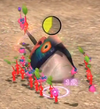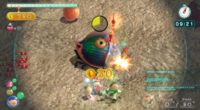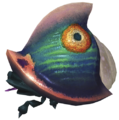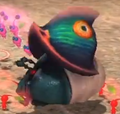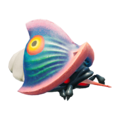Joustmite
| |||
|---|---|---|---|
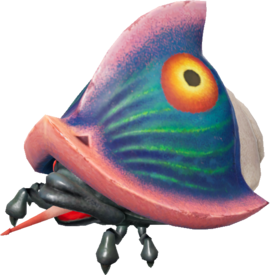
| |||
| Appears in | Pikmin 3, Pikmin 4 | ||
| Scientific name | Trilobitins reversa | ||
| Family | Burrow-nit | ||
| Areas | Distant Tundra, Sun-Speckled Terrace (Olimar's Shipwreck Tale), Blossoming Arcadia | ||
| Caves | Drafty Gallery, Engulfed Castle, Subterranean Swarm | ||
| Mission Mode Collect Treasure! stages | Thirsty Desert | ||
| Mission Mode Battle Enemies! stages | Distant Tundra Remix | ||
| Side Story days | Tundra, First Part Found | ||
| Dandori Challenge stages | Rockaway Cellars, Toggle Training | ||
| Dandori Battle stages | Leafy Showdown | ||
| Bingo Battle stages | None | ||
| Attacks | Stab and eat Pikmin | ||
The Joustmite (カブリムシ?, lit.: "Headgear-Wearing Insect") is an enemy in Pikmin 3 and Pikmin 4. Joustmites behave similarly to the Cloaking Burrow-nit, and are closely related to them. They can be seen as an opposite of the Burrow-nit however, as Joustmites shields the front of their body, requiring the Pikmin to attack from behind. Flying variants, known as Flighty Joustmites, also appear in Pikmin 3 and Pikmin 4.
Stats
| Game | Weight | Max. carriers |
Seeds | Value | Health |
|---|---|---|---|---|---|
| 7 | 14 (normally) | 6 | 450 | ||
| 7 | 14 | 6 (0 glow pellets) | 450 |
Notes
Alph's comments
“Structural flaw: hindquarters
Weight: 7
Brittany's comments
Charlie's comments
Louie's comments
Olimar's comments
“Joustmite
Trilobitins reversa
Burrow-nit family
Dalmo's Comments
Olimar's Notes (Pikmin 4)
“Others within this family wear their shells on their bellies, but this one's shell functions more like a helmet.
Its wings have atrophied into uselessness, so instead it burrows beneath the ground and pops out only to pierce prey with its needlelike proboscis and drain their bodily fluids.
Larval Joustmites remain underground for years, or even decades in some cases.”Louie's Notes (Pikmin 4)
Pikmin 3 Prima Guide
“The Joustmite spends most of its time partially buried with its colorful shell protruding from the ground. When it senses nearby prey, this well-armored creature emerges and uses its retractable beak to skewer nearby victims.
Rock Pikmin cannot be damaged by the Joustmite's attacks, making them a very good option when facing this enemy. When you're leading a large squad, however, any combination of Pikmin can make short work of this enemy. Approach the Joustmite from the rear and attack the creature's fleshy body until you defeat it.”Pikmin Garden
Text
“硬い殻で頭を守る、カブリムシ。前方からの攻撃にはめっぽう強い一方で、体の後ろはむき出しになっている。原種のハオリムシとは、守る位置が逆である。
特徴 その1 頭部を守る殻
- 獲物や外敵に向かってまっすぐ向かう性質があり、頭部を守るように殻が発達している。腹部はあらわになっていて、日中は地面に潜んでいることが多い。
- (Image text: 赤い目のような紋は、鳥類などからの捕食を避けるため)
特徴 その2 針のような口
- アゴの奥に長い針状の口吻を持ち、獲物に刺して体液を吸収する。
- (Image text: 鋭くとがっている)”
Translation
“The Joustmite protects its head with a hard shell. While it is extremely resistant to attacks from the front, the back of its body is bare. The position of its protection is the opposite of that of the original Burrow-nit.
Feature #1: Shell protecting the head
- The shell is developed to protect the head, due to its tendency to head straight for prey or enemies. Its abdomen is exposed, and it often lurks in the ground during the day.
- (Image text: "The red eye-like pattern helps it avoid predation from birds and the like")
Feature #2: Needle-like mouth
- It has a long, needle-like proboscis at the back of its jaw, which it uses to pierce its prey and absorb bodily fluids.
- (Image text: "It is sharp and pointy")”
Behavior
Just like the Cloaking Burrow-nit, the Joustmite hides partially buried in the ground, waiting for unsuspecting prey. Once a group of Pikmin enters the attack range of the enemy, it pops out from under the ground and proceeds to attack the player's Pikmin by attempting to use its long, needle-like proboscis to spear them. If any Pikmin are caught in this attack, they will be held in the air for a brief moment before being eaten. Unlike the Burrow-nit, the Joustmite can capture up to 3 Pikmin with this attack.
It should be noted that Rock Pikmin are immune to its stabbing attacks. The Joustmite can also shake off Pikmin, which also shakes its loose carapace. The enemy is rather slow-moving, making it easy to walk around and attack from behind.
Strategy
|
The following article or section contains guides. |
As mentioned before, the Joustmite protects the front of its body, making it completely immune to frontal assaults. The most effective strategy is to approach it from behind without waking it up, and proceeding to swarm the creature. If the Joustmite is awake, you can still try to run behind it and proceed to throw Pikmin, or you can run away, and the Joustmite will go back underground. Rock Pikmin are immune to its attacks, making throwing them at the Joustmite's rear another effective strategy. The enemy eats Pikmin at a rather fast rate, so be aware.
Technical information
| Pikmin 3 technical information (?) | |
|---|---|
| Internal name | kaburi
|
| HP | 450 |
| Rock Pikmin throw hits to kill | 10 |
| White Pikmin ingestions to kill | 3 |
| Bomb rock explosions to kill | 1 |
| Bomb rock ingestions to kill | 0 |
| Number of direct hits on top to kill | 0 |
| Damage to leaders | 10 |
| Territory radius | 200 |
| Mission Mode value | 30 |
Naming
- See more: Burrow-nit family#Naming.
- Common name: Joustmite. It is a combination of two words. "Joust" (or "jousting") is a medieval sport where two opponents riding on horses try to knock the other one off with a sharp lance, and refers to the Joustmite's sharp proboscis. The shell also greatly resembles a medieval knight's helmet. A "mite" is an insect.
- Japanese nickname: カブリムシ?, lit.: "Headgear-Wearing Insect". カブリ? refers to the act of covering one's head, especially with protective equipment, referring to its helmet-like carapace.
- Japanese name: サカサアカメバオリ?, lit.: "Inverted Red Eye Haori".
- Scientific name: Trilobitins reversa. Reversa is similar to "reverse". This could be in reference to how players attack the creature (from the back, rather than the front) or even its reversed weak-point positioning compared to the Cloaking Burrow-nit.
- Internal names: Its internal name consists of only the first word of its Japanese nickname,
kaburi(head). - Prerelease: None.
Names in other languages
|
The following article or section needs help from someone who can translate Chinese/Korean text. |
| Language | Name | Meaning | Notes |
|---|---|---|---|
| カブリムシ? Kaburi Mushi |
Headgear-Wearing Insect | ||
(traditional) |
披甲蟲 Pī Jiǎchóng |
||
(simplified) |
披甲虫 Pī Jiǎchóng |
||
| Helmmijt | Helm-mite | ||
| Cachepique | The name is a portmanteau of "cache" (hide) and "pique" (pike) | ||
| Gepanzerter Grabwicht | Armored Burrow Dwarf | ||
| Dorifora d'assalto | Assault burrow-nit | ||
| 덮구벌레 Deopgu-Beolle |
|||
| Soldadinho | Small soldier | The name is simply the diminutive form of the word "soldado" (soldier). This name is also commonly used to refer to insects in the Membracidae family | |
| Liendre astada | Horned nit |
Gallery
Pikmin 3
Rock Pikmin fight a Joustmite.
Pikmin 4
The Joustmite's Piklopedia icon.
A Joustmite fighting some Ice Pikmin.
Trivia
- Unlike the Cloaking Burrow-nit, the Joustmite's death and shaking animations show that its shell is unattached to its body, making it more of a helmet than an actual shell.
- Although Louie's notes on the Joustmite in Pikmin 3 were unique from his notes on the Cloaking Burrow-Nit, in Pikmin 4 they were changed to be nearly identical. Comparatively, Olimar's notes are distinct in both games.
